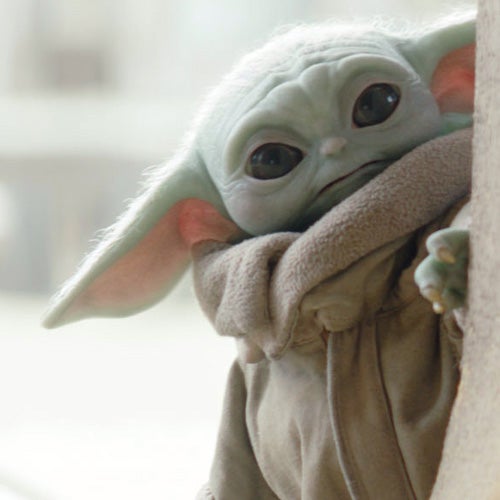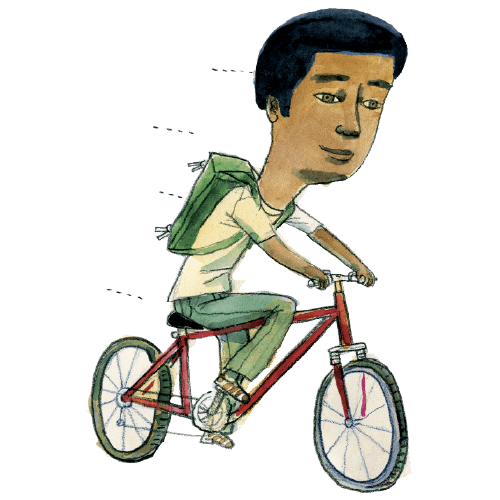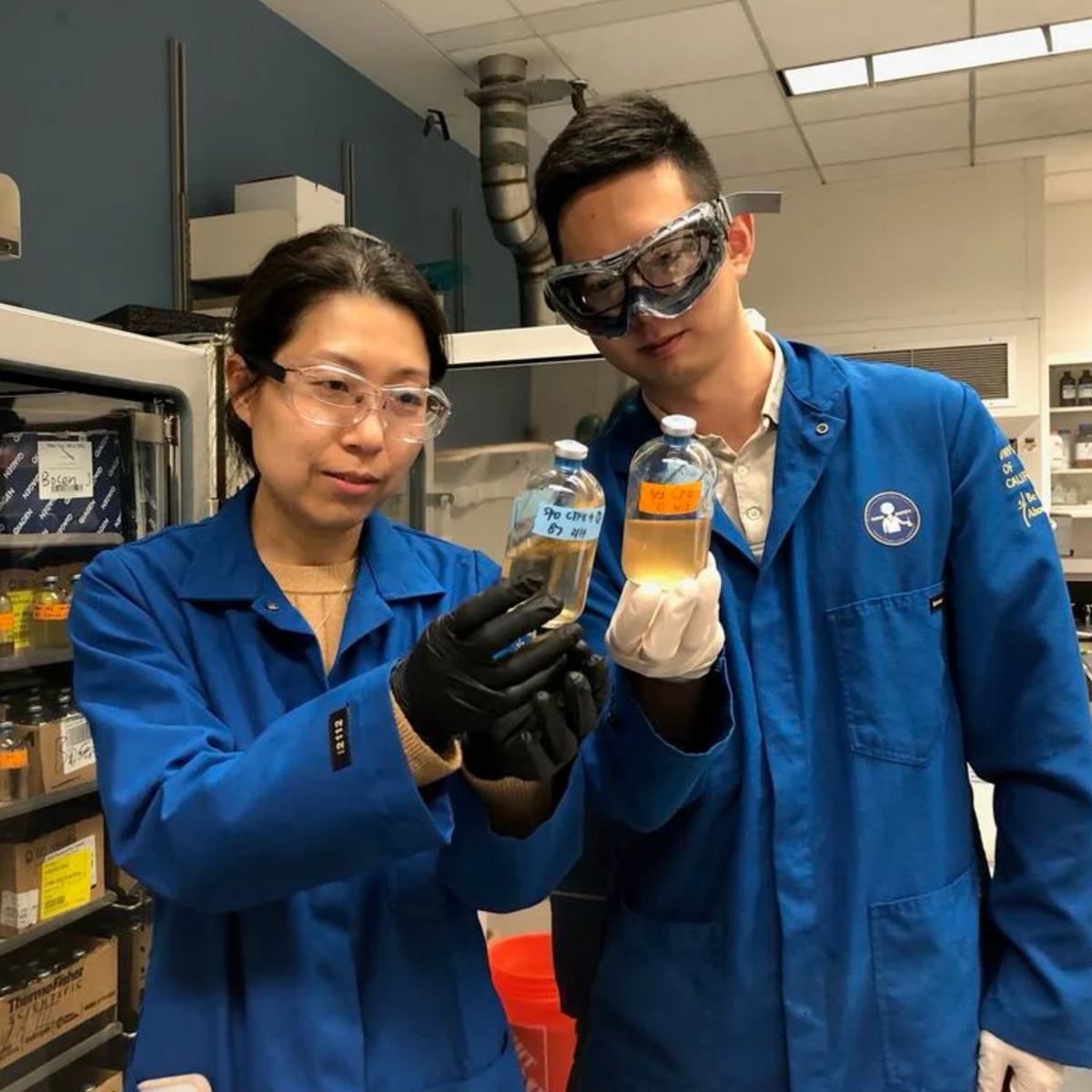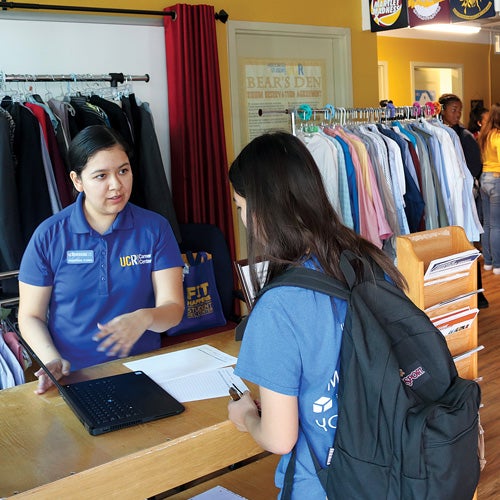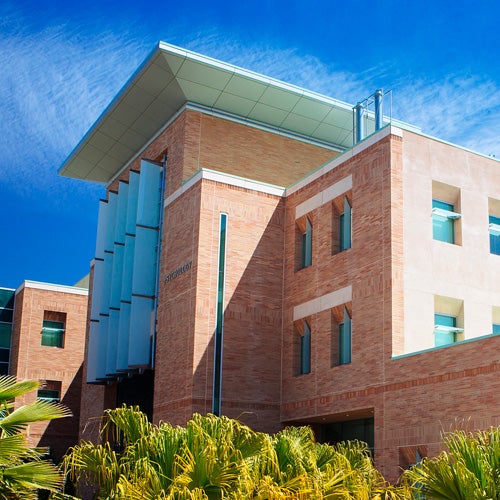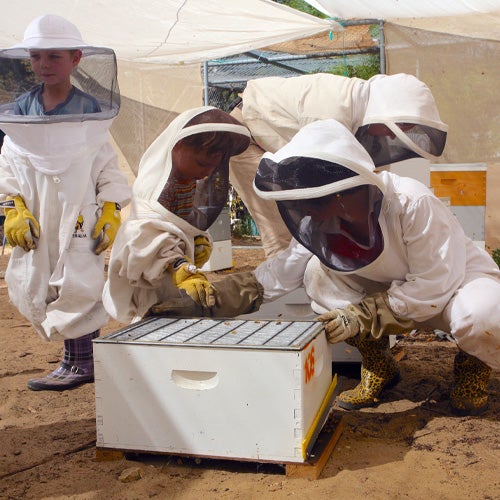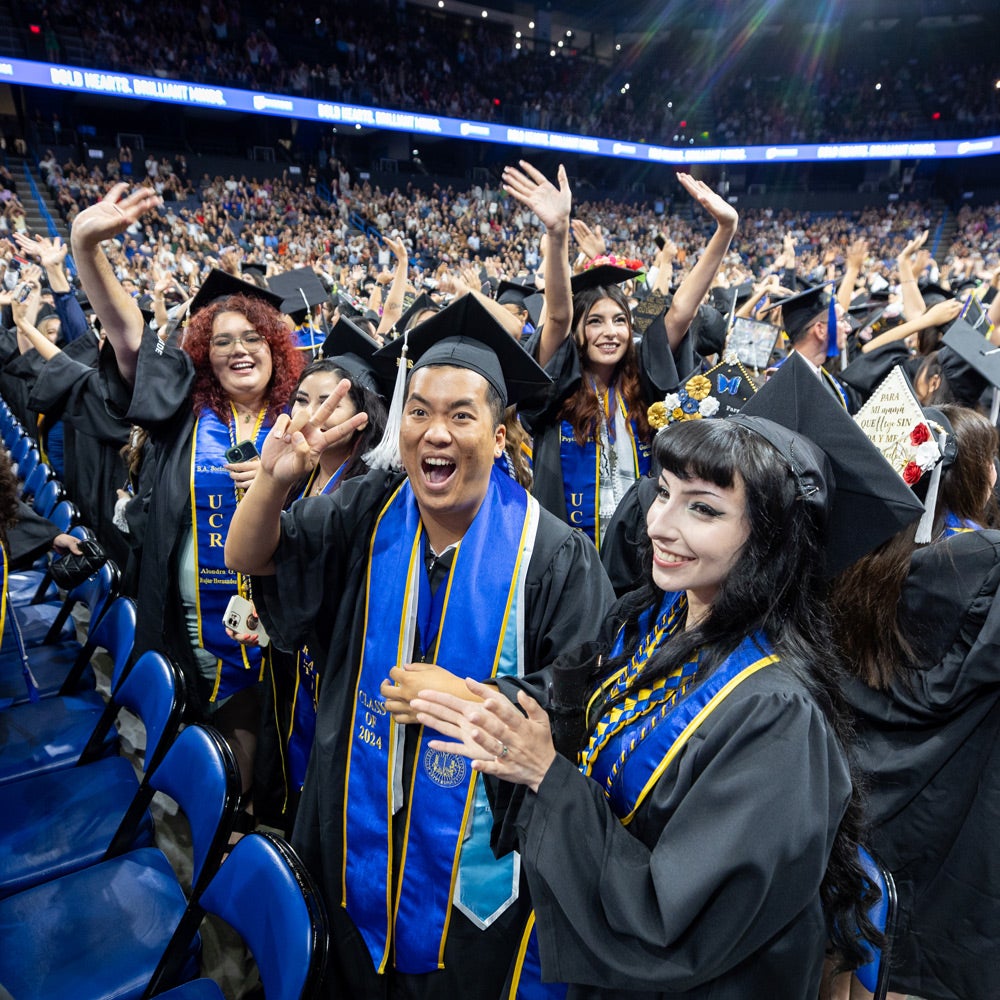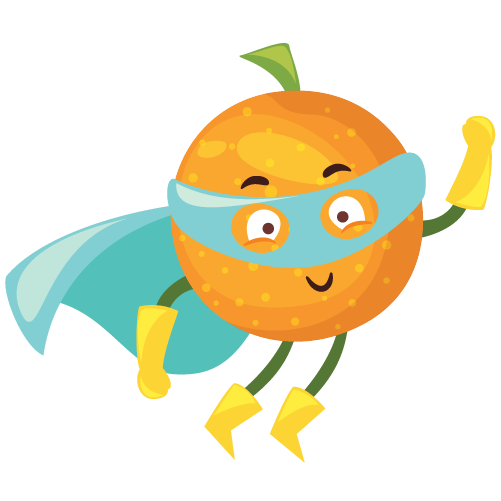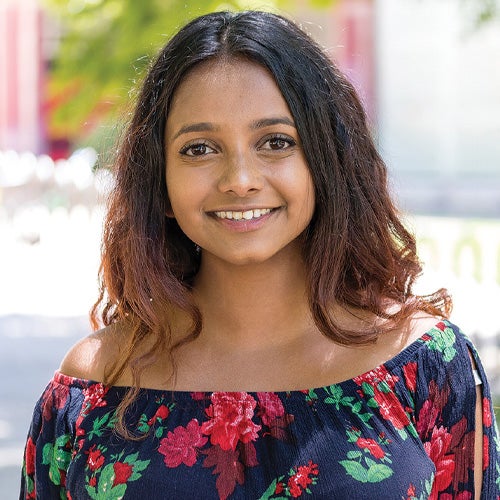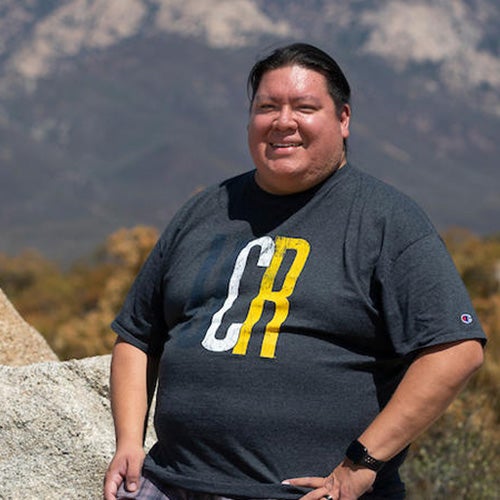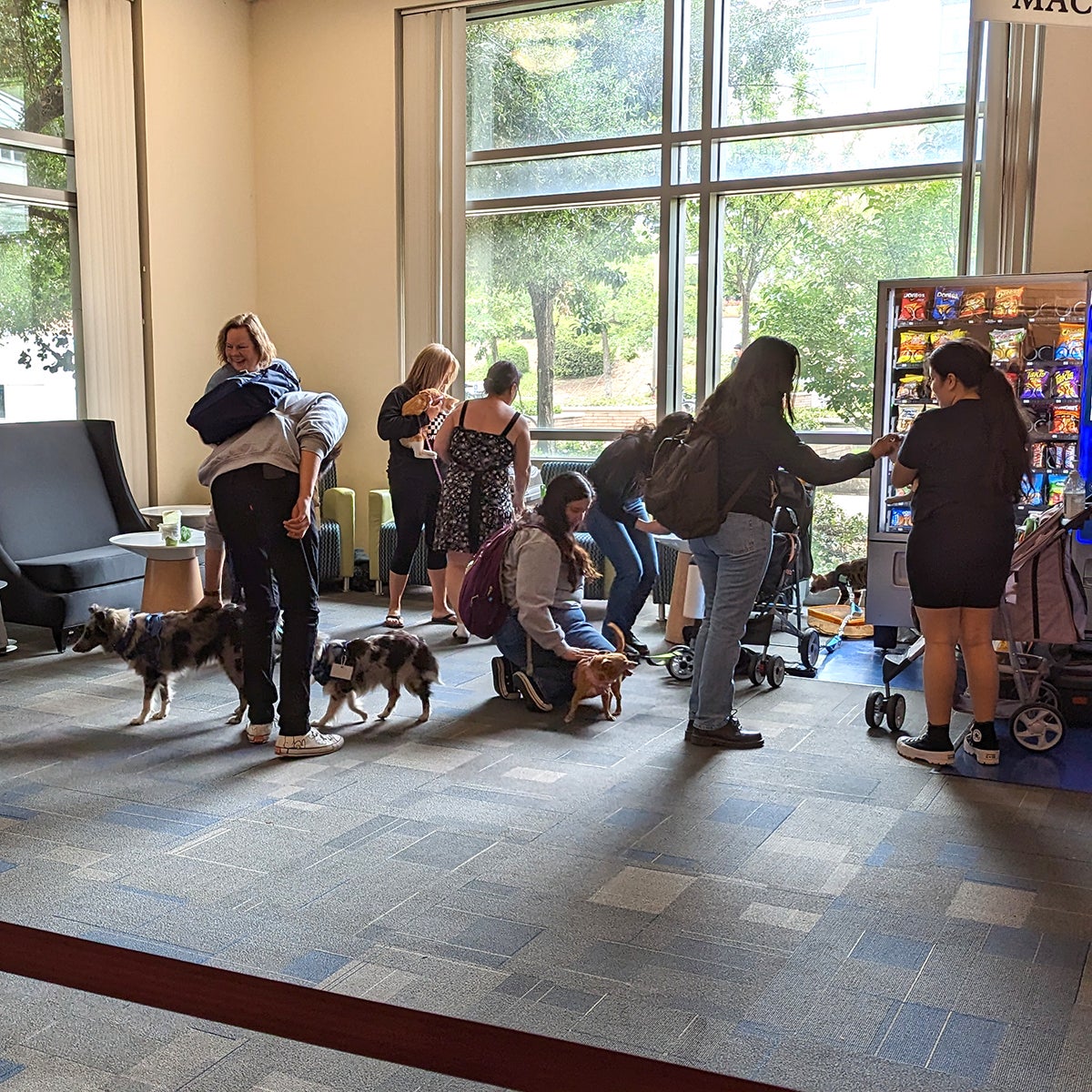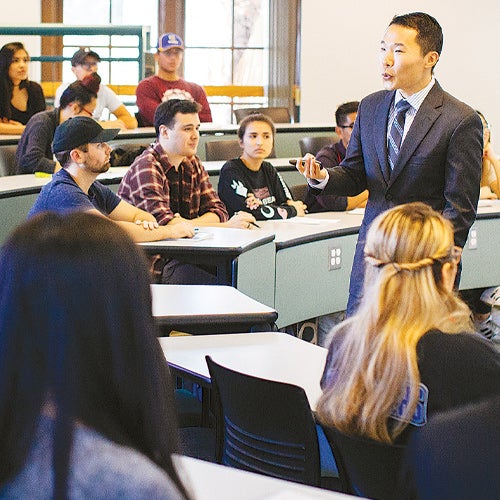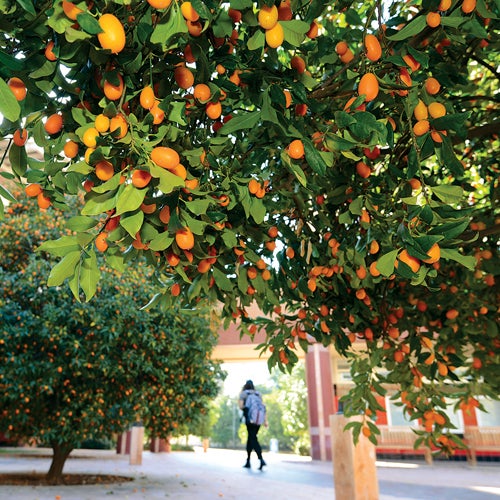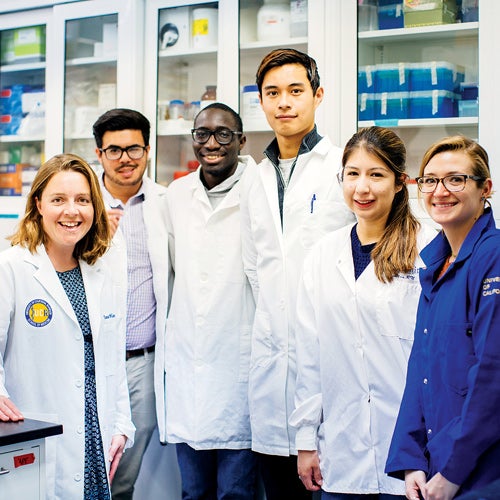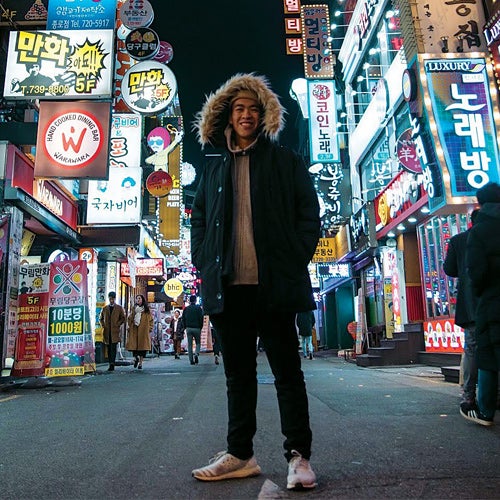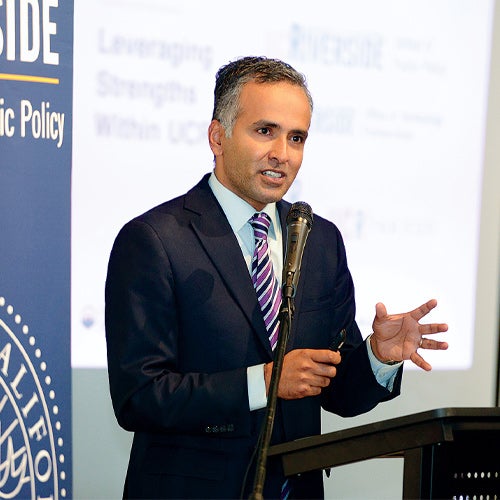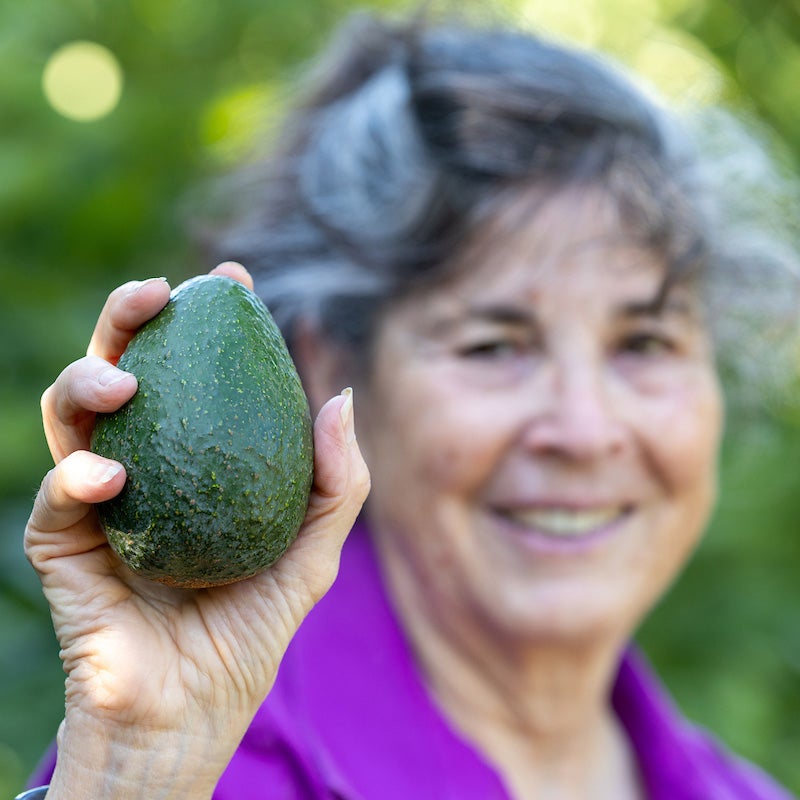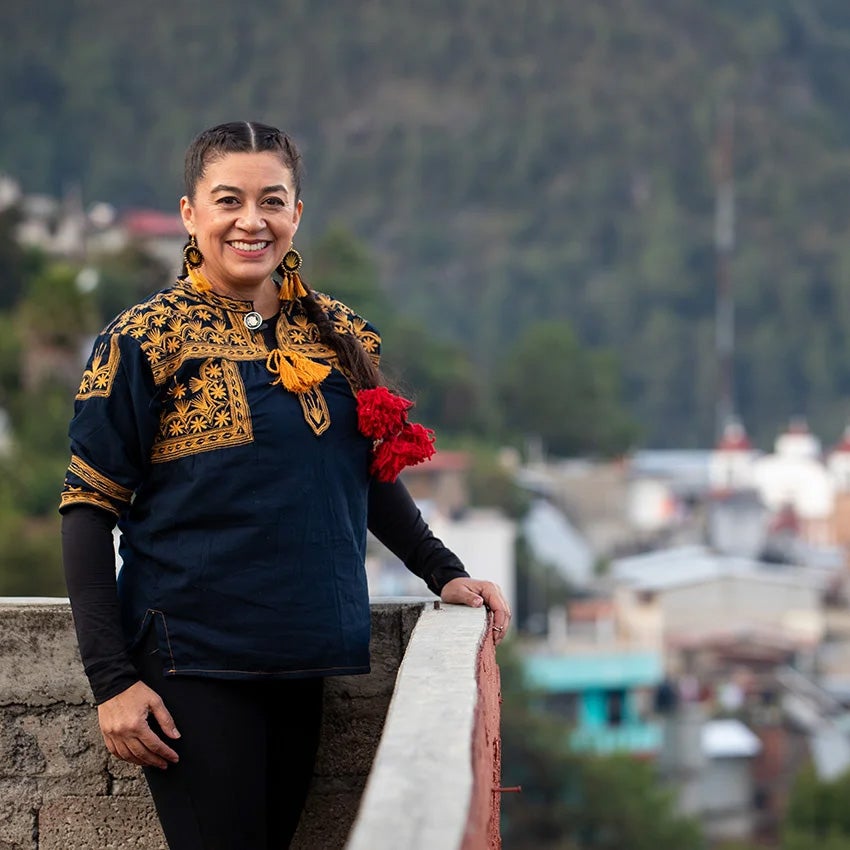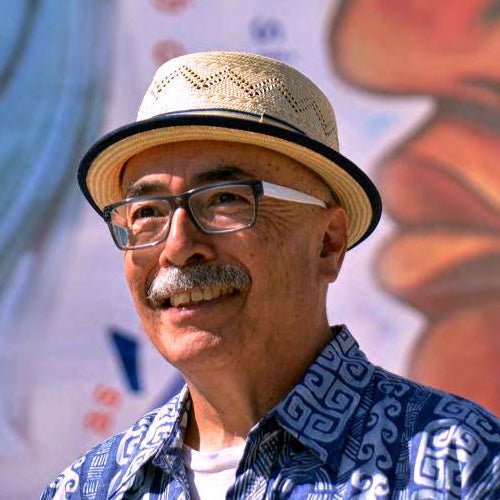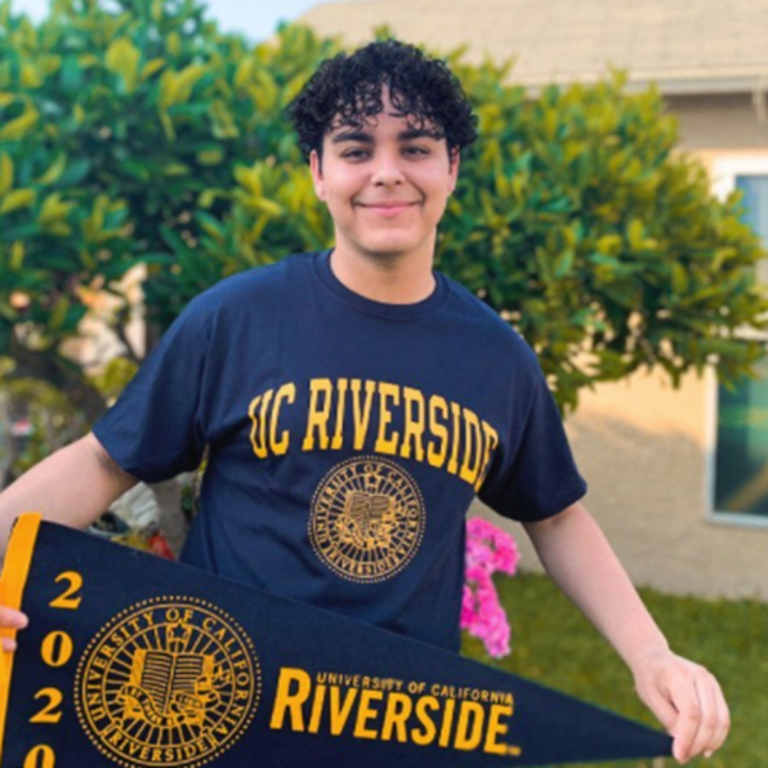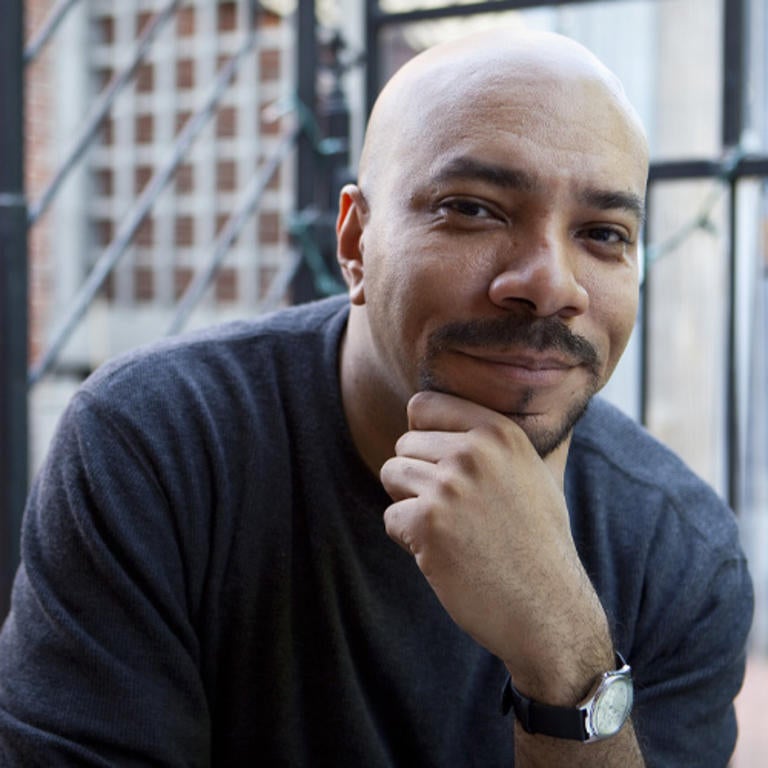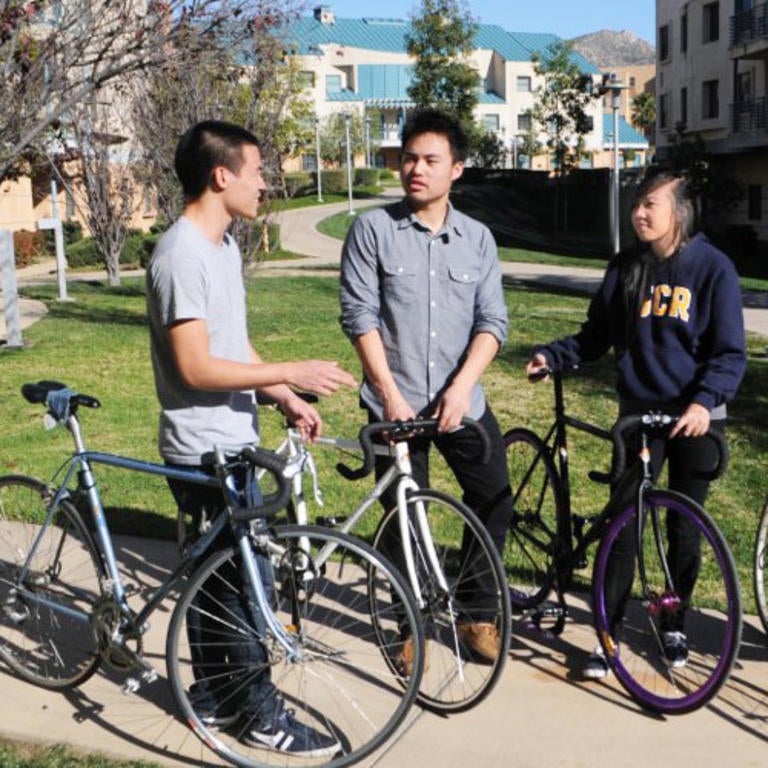
54 Facts: Academics
OUTSTANDING ACADEMICS (Facts 1–21)
As UC Riverside students continue to break boundaries, we'll keep grinding to pave the way for their limitless drive for greatness — and we’ll do the same for you.
Get to know our world-class faculty, including two Nobel Laureates, a Pulitzer Prize winner, countless social activists, and world influencers. Explore undergraduate research opportunities and learn how we’ll set you up for a lifetime of curiosity.
Fact 1: Meet the Professor of Baby Yoda

If you watched the Disney+ hit series, “The Mandalorian,” you probably found yourself fighting the almost uncontrollable urge to hug the heck out of Baby Yoda — also known as Grogu. That urge probably didn’t make sense at the time but Katherine Stavropoulos, a UCR professor and expert on “cute aggression” explains the urge and has the research to back it up. She states that cute aggression is the urge to squeeze, pinch, smother, or bite very cute things, including puppies, human babies, and Baby Yodas.
Stavropoulos has used neuroscience to explore how this unique care-taking response is triggered, and how the "aggression" aspect is mediated by the brain. “Basically, Baby Yoda has all the features that we consider prototypically 'cute' — huge eyes, small nose, big head,” Stavropoulos says. “We are evolutionarily programmed to find things like Baby Yoda 'cute' and to feel strong feelings towards them.”
Baby Yoda fans around the world (and especially at UCR) thank the Professor of Baby Yoda for making sense of his cuteness.
Fact 2: Affordable Education

Find out how affordable and valuable a UCR degree can be for California residents and out-of-state students. Applicants are automatically considered for scholarships and grants (free). If you apply for financial aid every year, your aid package could include additional scholarships and grants as well as loans (repaid) and federal work-study (earned funds). In 2024-25, 80% of UCR undergraduate students who applied for aid were awarded aid, and 99% of undergraduate students who were awarded aid received need-based scholarships and/or grants. UCR students who borrowed federal loans graduate with an average federal student loan debt of $17,517. UCR's repayment rate is excellent, with just over 98% of students repaying their federal loans on time. The Office of Financial Aid is ready to show you how to fund your UCR education, strategize a budget and understand credit, and cover unexpected expenses — all so that you can graduate from the greatest public university system in the world and benefit from more earnings and career opportunities!
Fact 3: Get to Know the Marlan and Rosemary Bourns College of Engineering (BCOE)

BCOE combines academic and research excellence, mentoring, undergraduate research, and internships. In addition to hands-on research and multi-faceted design programs that address real-world challenges, students engage with nearly 20 engineering student professional organizations.
Newest Major: Robotics is an exciting, rapidly growing industry. In this program, you'll work with leading faculty experts and gain training with top technology.
Accelerated Degree Programs: Earn an undergraduate degree and a masters degree within five years with BCOE's six Bachelor of Science + Master of Science (B.S.+M.S.) programs. Not all engineering schools offer graduate programs, let alone B.S.+M.S. programs. You can apply as an incoming first year-student or in your third year.
Ranked Globally: UCR is ranked in the Top 14% of Best Global Universities for Engineering (U.S. News, 2023). UCR is No. 56 for Best Undergraduate Computer Science (U.S. News, 2024) and among the top 13% of all ranked world universities for engineering and technology (Times Higher Education, 2022).
Better Tomorrows: Jinyong Liu, Haizhou Liu, and Yujie Men (pictured left) from the Department of Chemical and Environmental Engineering developed methods to clean up contamination from highly toxic “forever chemicals." Alexander Baladin, distinguished professor of electrical and computer engineering, developed quantum composites to advance electrical, optical, and computer technologies. Vasileios Christopoulos, assistant professor of bioengineering, is studying patients’ behavioral and neurological data as they play video games during brain surgery to better understand and treat Parkinson’s disease.
Fact 4: #UCRCareerReady

UCR students and alumni can get interview- and career-ready thanks to the services and resources available at the Career Center. Explore professional/career options through a series of on-campus events, personalized career counseling, career fairs, and job search skill-building workshops. International students can also take advantage of meeting with the Center’s International Student Career Specialist for support with U.S. and global job searches. Join the Career Center for panels and networking events where you can meet recruiters from top organizations. Log into UCR Handshake to access jobs and internships from more than 200,000 employers around the world. Through the R’Professional Career Closet, the Career Center is able to provide students with free professional attire for interviews, networking events, and career fairs, much of which is donated by members of the UCR community.
Fact 5: Get to Know the College of Humanities, Arts, and Social Sciences (CHASS)

The Psychology Building
CHASS uniquely combines the arts, humanities, and social sciences into a single college so that students can explore human life and meaning from many perspectives.
Specialized Studies: UCR is the only UC campus to offer an undergraduate degree in creative writing and the only UC campus with a low-residency M.F.A. program. It's the first UC campus to offer a Native American history Ph.D., the first UC campus to offer an Indigenous language series (Cahuilla) that fulfills graduation language requirements to all students, and was the first university in the nation to offer a Ph.D. in dance studies.
Best in Class: CHASS faculty have been recognized globally for their art, research, and contributions to their fields. Carolyn Murray, professor of psychology, won the Dr. William Montague Cobb Award for her work addressing health disparities in the Black community. John Jennings, professor of media and cultural studies, won an Eisner Award for co-creating "Kindred," a graphic novel adaptation of Octavia E. Butler's work. Walter Clark, professor of music history, is a noted scholar of Spanish and Latin American music and was knighted by King Felipe VI of Spain.
Fact 6: Saving Honeybees

UCR is working to stop and reverse a worldwide decline in honeybees, which threatens food security and prices. Honeybees pollinate more than 80 agricultural crops, which account for about a third of what we eat (estimated annual value of more than US$9 billion). To boost dwindling honeybee populations, the UC’s Office of the President awarded $900,000 to a four-campus network of bee researchers and engineers. The network is one of the largest honeybee health networks in the United States, and includes researchers from UC Davis, UC San Diego, UC Merced, and UCR’s College of Natural and Agricultural Sciences (CNAS). Together they’re developing breeding programs, treatment for sick bees, and health monitoring to keep bees alive, prevent irreversible colony collapses, and keep our food affordable.
Fact 7: A Leader in Social Mobility

In 2025, U.S. News named UCR the No. 1 university in the nation for social mobility. This means that UCR is nationally recognized for elevating low-income graduates to a higher standard of living.
UCR is recognized nationally as a top university for enrolling and graduating Pell Grant or low-income students. Washington Monthly magazine ranked UCR No. 12 nationally in Pell Grant enrollment performance. Need-based Pell Grants are awarded to students with annual family incomes below US$75,000.
Twenty-five first-generation students received a four-year scholarship to help cover some of their UC tuition, thanks to the Kessler Scholar Collaborative. The program celebrates and builds upon first-generation students' assets and strengths. These students make up the inaugural cohort of 25 Kessler Scholars to UCR.
Fact 8: Get to Know the College of Natural and Agricultural Sciences (CNAS)

In CNAS, faculty and more than half of our undergraduate students work side-by-side in an interdisciplinary environment that flows easily among the life, physical, mathematical, and agricultural sciences. Facilities like the new Multidisciplinary Research Building 1 (MRB1) make this possible by creating a shared space that enhances research and collaborations across disciplines.
Star Gazing: Astronomy students have access to UC telescopes and can look over the shoulders of department researchers, including remote observing with the Shane 3-meter and the Nickel 1-meter telescopes at Lick Observatory on Mt. Hamilton, California, and the 10-meter twin telescopes Keck I and Keck II at W.M. Keck Observatory on Maunakea, Hawai’i.
Protecting Citrus: UCR researchers are working with researchers from other institutions at a new biosafety level 3 laboratory near campus to find ways to prevent and cure Huanglongbing, or HLB, a disease that prevents fruit from ripening. The disease, which is caused by a bacteria that is spread by a tiny insect, the Asian citrus psyllid, has decimated citrus crops in Florida and China, and has been detected in backyard trees in Los Angeles, Orange, and Riverside Counties.
Fact 9: Pillars of Excellence
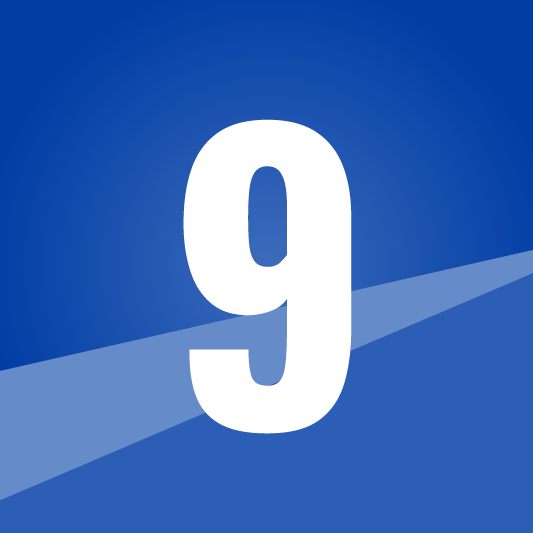
Students in University Honors engage with faculty through interdisciplinary courses; connect with other Honors students in first-year, transfer, and upper-division Living-Learning Communities; and take part in faculty-mentored research, creative activity, or experiential learning. Honors students have the opportunity to create their own undergraduate capstone project. “I have … learned what it really means to be a leader and to be civically engaged in my community, which consists of promoting creativity, appreciating diversity, and having a willing heart to give,” says Joanna Sung, University Honors alumna, class of ’89.
Fact 10: Building Community
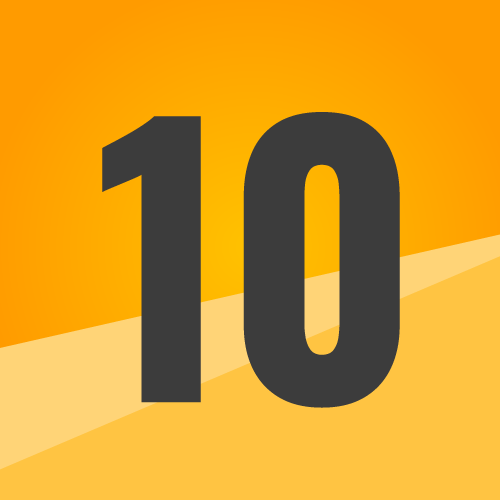
UCR’s International Students and Scholars Office welcomes over 700 students from over 80 countries. One of those students, Viresha Perera (BA Psychology ’19, MBA Marketing and Management '22), was born in Sri Lanka and grew up in Dubai. She came to UCR to earn a degree in psychology and spent much of her time working on events and resources to benefit not just international students like herself but the UCR community as a whole by registering a student organization. “We wanted to make a space where we can allow and enable [international students] to make those connections and feel more a part of the UCR campus,” she says. Perera won the Outstanding International Undergraduate Student Award in 2018 for her work in assisting other international students to make meaningful connections.
Fact 11: Get to Know the School of Education (SOE)

At SOE, faculty, students, and researchers are engaged in transformative partnerships that benefit K-12 students, families, and educators, and advance research and discourse in the field of education.
Undergraduate Program: The education, society, and human development undergraduate major helps students inspire the next generation. Community learning is a signature feature of the program, and through partnerships with local schools, nonprofit organizations, and government agencies, students engage in meaningful research, expand their learning opportunities, and amplify their success.
Unique Minor: Explore SOE's athletic leadership minor, which is the first athletics-based undergraduate academic program for UCR and the UC system! Students can get their degree in a different UCR college or school and still pick up this minor.
Graduate Programs: SOE offers master’s, doctoral, and teacher credentialing programs that prepare students to become outstanding classroom educators, researchers, and educational leaders.
Learning from Experts: Students can work with top researchers and receive a result-oriented education with experienced faculty and nationally recognized experts in autism, special education, higher education, STEM, equity and access, school psychology, and educational policy research.
Fact 12: How Do You Say “First” in Cahuilla?

UCR is the first UC campus to offer Cahuilla (the language of Southern California Cahuilla Indian Nations) as an accredited language series. Offered by the Department of Comparative Literature & Languages, this four-class series includes three lower-division courses and one-upper division class, which satisfies undergraduate foreign language requirements for most of the College of Humanities, Arts, and Social Sciences (CHASS) majors.
Doctoral student William Madrigal Jr., a member of the Cahuilla Band of Indians, teaches the courses, which are open to all UC students and Cahuilla tribal community members — thanks to concurrent enrollment.
“The interesting thing here is that Cahuilla is not a foreign language because it’s very much local and indigenous to Riverside County,” Madrigal Jr. says. “Students are learning more than just the mechanics of the language. They are learning about a rich and vibrant culture. They are introduced to the Cahuilla culture, philosophy, and worldview.”
Fact 13: A Finals Frenzy

The UCR Library is the perfect place to go when you need to read, conduct research, or study. It’s also the perfect place to de-stress during finals, which take place the last two weeks of every quarter. Launched in 2013 by the Library’s Access Services Department, Finals Week Stress Relief gives students a break from studying and a chance to unwind. Activities and events regularly include food giveaways to help combat food insecurity on campus, time with Therapy Fluffies (trained therapy animals), Study Break Corners that include board games and fun activities, craft events, and more. The best part? It’s free, thanks to partnerships with departments, clubs, and organizations across campus! “The Finals Week Stress Relief team is composed of compassionate and caring Library staff who want to help students de-stress before and during finals week,” says Brendon Wheeler, Maker Services Coordinator. “It’s also a great way for our staff to get to know students and for the Library to help students' health and wellness.”
Fact 14: Get to Know the School of Business

UCR boasts the largest undergraduate business program in the entire UC system, along with a full-time Master of Business Administration (MBA), Professional MBA, Master of Professional Accountancy (MPAc), Master of Finance (MFin), Master of Science in Business Analytics (MSBA), and a Ph.D. program.
New Major: Business Analytics is a brand new four-year program around using data and analytics techniques to assess business performance and predict future trends helping businesses improve their decision-making processes and fuel growth. Providing hands-on experiences, the program also requires an internship in the business analytics field.
Customized Learning: Students in the undergraduate program can tailor their degree to align with their career goals through seven concentrations and nine minors. Double alumnus Valtteri Salomaki ’18, ’20 MBA did just that when he added courses in Blockchain Application in eCommerce and Full-Stack Product Development to his undergraduate degree. He continued his education at UCR Business and earned his MBA. “The A. Gary Anderson School of Management provided me with all the resources and support I have needed to achieve my ambitious goals,” says Salomaki.
National Recognition: The school is accredited by the Association to Advance Collegiate Schools of Business which places it among the top 6% of business schools worldwide. U.S. News ranked both the School of Business undergraduate program at No. 70, and the school’s A. Gary Anderson Graduate School of Management among the top 100 programs in its 2023 listing of the Best Business Schools.
Consumer Thinking: Thomas Kramer, professor of marketing and associate dean of undergraduate programs, investigates the beliefs, biases, and heuristics that affect consumer choice and behavior. In 2020, he was selected as co-editor of the prestigious Journal of Consumer Research.
Fact 15: Real Roots

During more than a century of discovery, scientists at UCR’s Agricultural Experiment Station-Citrus Research Center have earned worldwide recognition for the study of plant sciences, environmental and natural resources, and pest management. Every orange, lemon, lime, and mandarin orange found on your grocer’s shelf has a genetic connection to the trees at our Citrus Research Center, which was established in 1907. We’re also home to the Citrus Variety Collection, a living citrus museum with some 900 varieties of citrus — the largest collection in the world. You can drink juice or even beer made from oranges grown on campus at our dining venues! So that sweet and juicy California navel orange you had for lunch today had its roots right here at UCR.
Fact 16: Get to Know the School of Medicine (SOM)
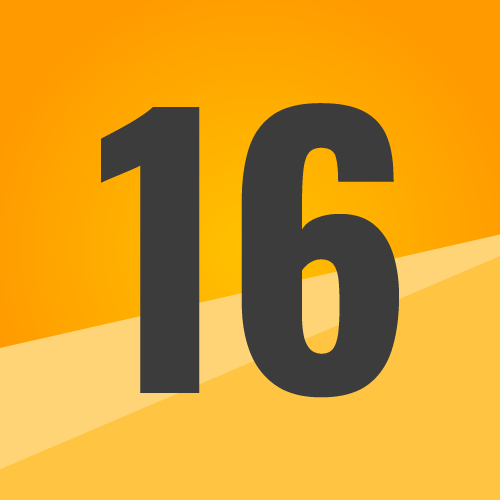
UCR SOM was created to improve the health of the people of California, especially the medically underserved throughout our Inland Southern California home. The school does this by training the next generation of medical doctors (M.D.s) and biomedical researchers, and by developing innovative research and health care delivery programs that address the needs of our communities. Plus, it ranks No. 7 on the U.S. News & World Report’s list of Most Diverse Medical Schools (2024).
In Practice: UCR SOM’s graduated almost 400 physicians and trained over 200 residents to help address the healthcare workforce shortage.
Getting In: Each year, The Thomas Haider Program at the UCR School of Medicine guarantees up to 24 seats in the incoming UCR SOM class to current UCR undergraduate students or recent UCR graduates who fit the school’s mission and meet admission qualifications. Qualifying UCR undergraduates who want to commit to attend UCR SOM may apply to the Thomas Haider Early Assurance Program (EAP). Students selected for EAP avoid the time, stress, and expense of the traditional application process and do not have to take MCAT, allowing them to spend their final undergraduate year focusing on community engagement and gaining additional clinical and research experience.
Doctors and Doctorates: In addition to producing excellent physicians, UCR SOM trains the next generation of research scientists in the Division of Biomedical Sciences. The program offers Ph.D. and M.S. degrees to students who will bridge the gap between basic science research and clinical medicine through independent research.
Building to Serve: UCR SOM celebrated the grand opening of it new Education Building II, which is one of the most innovative learning facilities in the nation. It will further the UCR SOM’s mission to increase the number of physicians in the underserved inland Southern California!
Fact 17: Experience the World
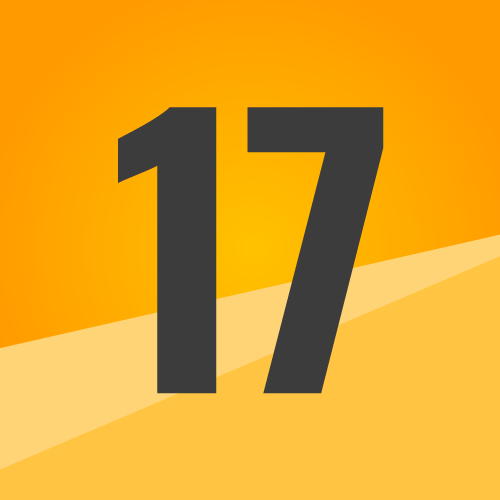
At UCR, your education is not limited to our beautiful campus. Discover the world by going abroad on one of our international programs. Students earn academic credit abroad and can choose full-year or short-term programs in a wide range of majors. Best of all, studying in a different country doesn’t have to be expensive! Many Education Abroad programs offer exceptional value at costs comparable to staying at UCR, and you can use UCR financial aid, scholarships, and grants to study abroad. “The experience allowed me to immerse myself in a completely new culture, meet people from all over the world, and travel to numerous countries,” Ghanee Ludin, ('20, business administration, pictured), says of his experience studying in Hong Kong during his junior year. “It gave me a new perspective on life and made me view the world through a different lens.”
Fact 18: Get to Know the School of Public Policy (SPP)
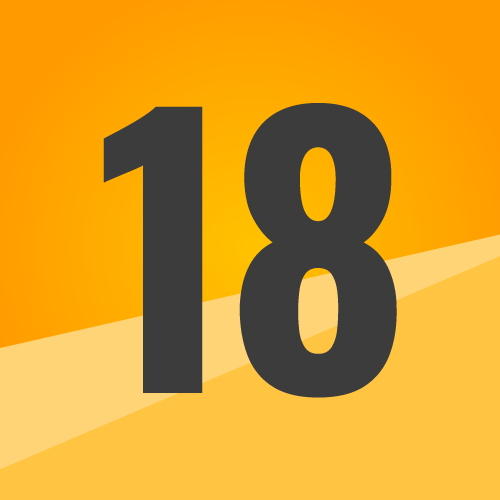
UCR has the first public policy school with an undergraduate public policy major in the entire University of California system. It offers undergraduate and graduate degrees, and its interdisciplinary program allows students to fulfill their requirements by taking courses from 12 departments, from film and visual culture to political science.
Specialized Programs: Along with Stanford, Carnegie-Mellon, USC, and Brown, UCR is one of the few universities in the United States to offer an undergraduate major in public policy. Students who pursue an undergraduate public policy major take courses related to a wide variety of policy areas, including discrimination and identity, education, health, international, migration and citizenship, and water.
Real-World Focus: The research conducted by Karthick Ramakrishnan (pictured), professor of public policy and political science, and founding director of the Center for Community Solutions, focuses on civic participation, immigration policy, and the politics of race, ethnicity, and immigration in the United States.
Fact 19: The Luna UCR™ Avocado
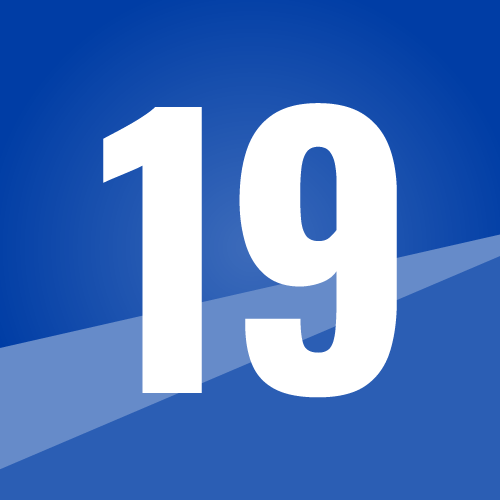
Mary Lu Arpaia
Introducing, the Luna UCR™! This new avocado variety is the result of more than a half-century tree breeding by UCR horticulturists and was released to commercial growers worldwide. It offers great flavor, a rind that turns a tell-tale black when ripe, and high post-harvest quality. Plus, growers benefit from a smaller tree size, allowing denser plantings for more efficient and safer harvesting, minimal pruning, and potentially higher yields. The Luna UCR™ was selected as one of TIME’s 2023 Best Inventions and is “changing how we live, work, play, and think about what’s possible,” said TIME in a statement.
Fact 20: The Land of Musicians

Xóchitl Chávez
Xóchitl Chávez, assistant professor of music, has been researching Oaxacan philharmonic bands for 15 years. In summer 2023, she spent four days documenting the work of the all-female Indigenous band, Mujeres del Viento Florido, in Santa María Tlahuitoltepec, a mountainous community in the southern state of Oaxaca, México. Over the past 10 years Mujeres del Viento Florido’s trajectory has been central to research conducted by Chávez. This philharmonic band’s influence in Tlahuitoltepec means offering professional careers for women — for many it also means defying societal expectations such as marriage and childbearing. Chávez’s research also includes the impact of Oaxacan music in the United States, including the flourishing number of Oaxacan bands in Los Angeles and across the U.S.
Fact 21: UCR Writers Week

Every year, the UCR community, Riverside locals, and people from basically everywhere gather on our campus to be in the presence of literary greatness at our annual Writers Week. California’s longest-running, free, literary event features award-winning authors, like UCR Professor and Pulitzer Prize finalist Laila Lalami — alongside up-and-coming artists from around the world. 2021’s event honored three internationally renowned United States Poet Laureates, Rita Dove, Joy Harjo, and Juan Felipe Herrera.
Hosted by UCR’s Department of Creative Writing, this annual event is free and open to the public.
Guess what? UCR’s literary magic doesn’t only occur during Writers Week. Award-winning poet, playwright, producer, and icon Maya Angelou visited our campus twice: once to give the commencement address in 1977 and the other to read her poem, “A Brave and Startling Truth,” in 2009. And, you should know that UCR offers the only Bachelor of Arts degree in Creative Writing at any UC campus. Yeah, we really know how to do this writing thing.
